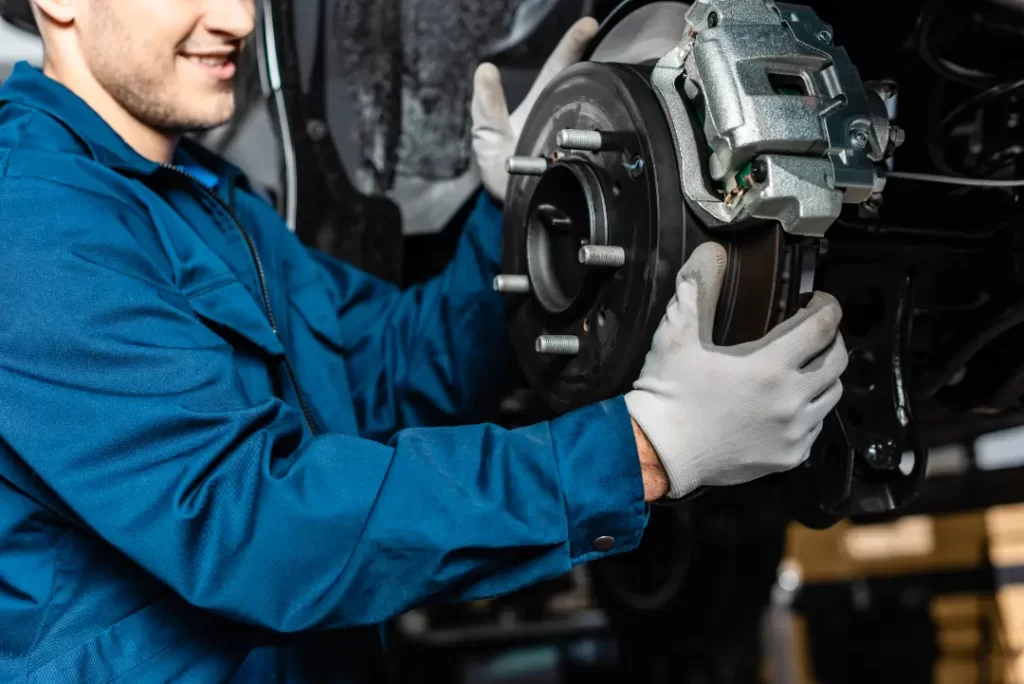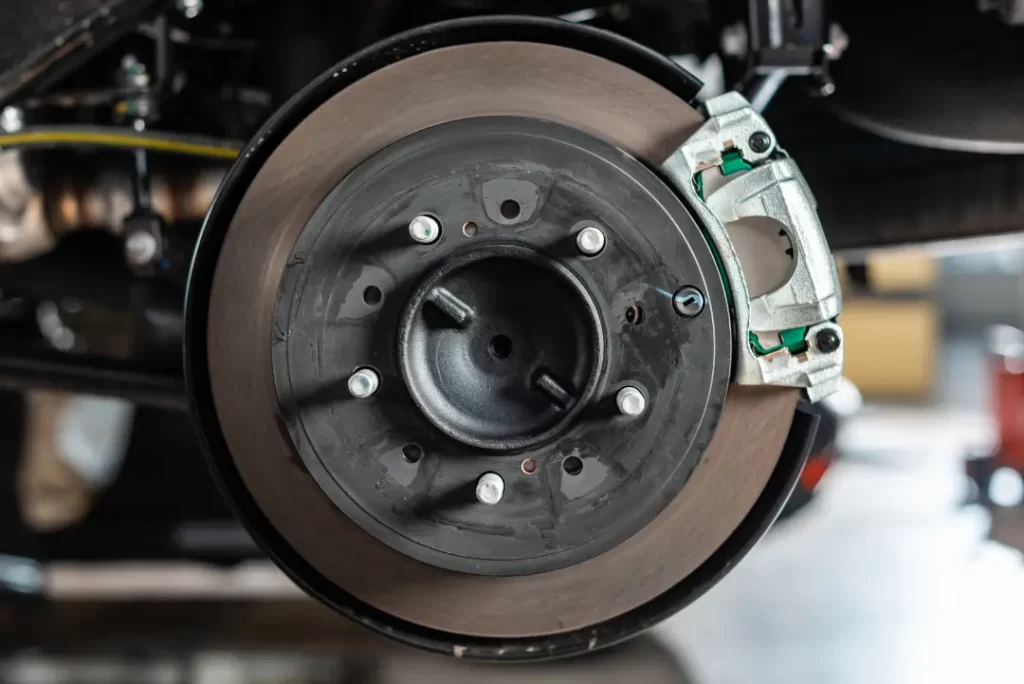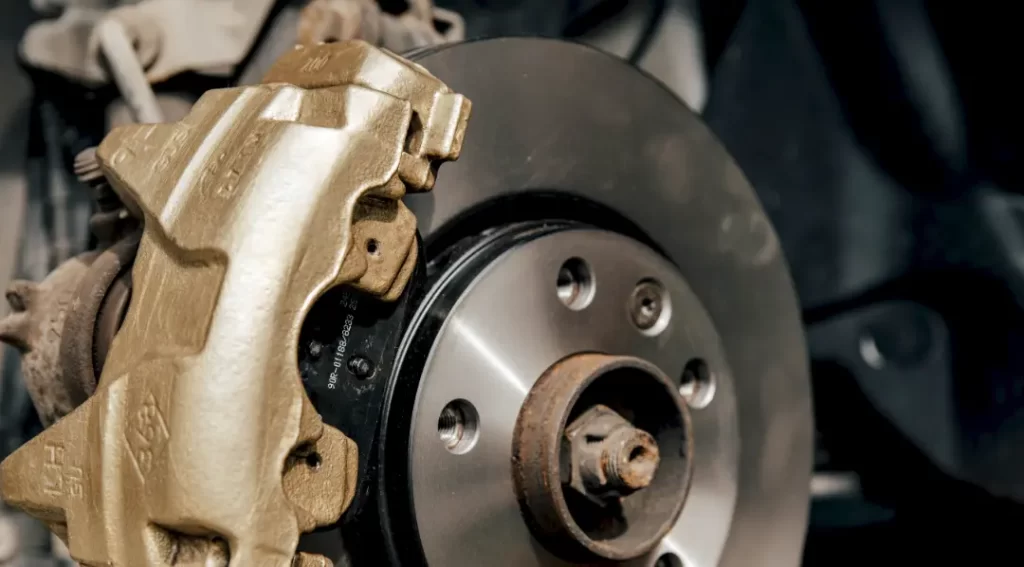Are you wondering why your car brakes are squeaking? The brake caliper plays a crucial role in applying pressure to the brake pad, and issues with the caliper can also lead to squeaking noises. This guide will explain the common reasons behind squeaky brakes and what you can do to fix them. Whether it’s worn brake pads, debris, or rust, understanding the cause can help you take appropriate action.
Read on to learn how to diagnose and solve your brake noise issues
Key Takeaways
- Squeaky brakes can signal worn-out pads, dust, or moisture and should be inspected promptly to avoid costly repairs.
- Regular maintenance like cleaning and lubrication can help prevent squeaks, while replacing worn brake pads ensures effective braking.
- A professional inspection is crucial for persistent brake noises to identify and resolve underlying issues.
Introduction
In this guide, we’ll explore the common causes of squeaky brakes and provide practical solutions to fix them. From understanding why your brakes squeak to learning about different types of brake noises and their implications, we’ll cover everything you need to know.
By the end of this blog, you’ll know how to maintain your vehicle’s brake system and stay safe on the road.
Common Causes of Squeaky Brakes
Squeaky brakes can be caused by various issues, from worn-out brake pads to dust and debris trapped in the system. Also, certain types of brake pads, particularly semi-metallic ones, are more prone to squeaking than others, such as ceramic pads.
Understanding these common causes can help you effectively address the problem and maintain your vehicle’s safety.
Regular inspections can spot early signs of wear or damage, enabling timely action before problems escalate. Here are some specific causes of squeaky brakes.

Worn-Out Brake Pads
One of the most common reasons for squeaky brakes is brake pad wears, which occurs when the pads have reached the end of their lifespan. Brake pads are designed with metal wear indicators that create a squeak when it’s time for replacements. This high-pitched noise is a clear signal that the brake pads are approaching their minimum thickness and need to be replaced soon. Ignoring this noise can lead to additional issues, such as requiring new rotors along with brake pads. It’s crucial to replace worn brake pads promptly to prevent further damage to the braking system.
When the metal wear indicators rub against the rotor, it creates a squeaking sound that can be quite annoying. This sound is a built-in safety feature to alert drivers that their brake pads need attention and should not be ignored. Routine brake service can help avoid this issue and keep your brakes in good condition.
Dust and Debris
Accumulated dust or dirt on brake components can also lead to squeaking noises. A common cause of squealing noises is debris stuck between the brake pads and rotors. This debris can include mud or other materials. If your brakes have not been used for a while, dirt can create a squeaking noise until it’s cleared.
Cleaning or sanding down the surfaces can often resolve the noise. Regular cleaning and maintenance can help stop squeaky brakes caused by dust and debris.
Weather Conditions
Weather conditions such as rain, snow, and humidity can lead to squeaking brakes. These factors can affect brake performance and sound. Moisture collecting on the rotors can lead to a thin layer of rust, resulting in a high-pitched noise when the brakes are applied. This is especially common overnight, where condensation can cause rust to build up.
Fortunately, applying the brakes usually clears the rust, reducing noise after a few uses. These temporary squeaks usually resolve after driving for a short period.
Types of Squeaking Brake Noises
Different squeaking brake noises signal various issues within the brake system. Recognising these sounds helps identify underlying problems and take appropriate action.
From high-pitched squeaks to grinding noises, each sound has its own set of implications.

High-Pitched Squeak
A thin rust or dirt clearance layer often causes a high-pitched squeak in brakes. This type of noise is generally not a major concern if it occurs infrequently and usually goes away after a few braking applications.
However, if the high-pitched squeak persists, it’s worth investigating further to rule out any underlying issues with your brake system.
Squealing Noise
A squealing noise often indicates worn-out brake pads. When brake pads become worn or thinned, they can’t dissipate heat effectively, leading to a squealing sound. This is a clear sign that the brake pads need to be replaced.
Promptly addressing this issue can prevent further damage to your brake system and ensure safety on the road.
Grinding Noise
Grinding noises in brakes can be caused by a layer of rust buildup, worn pads, or dirt and debris. This noise is more severe and indicates that the brake pads are excessively worn, potentially damaging the brake discs.
If you hear a grinding noise, get your brakes checked by a professional immediately. Ignoring this noise can lead to more significant brake issues and costly repairs.
Effects of Heavy Loads and Driving Style
Carrying heavy loads and your personal driving style can significantly impact brake performance and lead to squeaky brakes. Understanding these effects allows you to adjust to reduce brake noise and wear.
Heavy Loads
Carrying heavy loads increases brake wear and may cause the brakes to squeak. When brakes get hot due to heavy loads, the metal can swell, worsening the noise. While infrequent heavy loads causing squeaking brakes are usually not a major concern, it’s advisable to empty your vehicle of excess weight to prevent persistent noise.
Regular heavy loads might indicate a more serious problem that needs attention.
Personal Braking Style
Aggressive braking habits can accelerate brake component wear, increasing noise levels. Pressing the brake pedal generates friction and heat, which can lead to brake pad wear and squeaking noises if not managed properly. Consistent hard braking can cause brake pads to overheat and lose their effectiveness, resulting in a squeaking sound. When brake pads become glazed due to excessive heat, they significantly reduce friction, impairing braking performance.
Adopting a more gradual and measured braking style can prevent these issues and extend the life of your brake hardware components.
It can be frustrating when your new car brakes start squeaking, but this is often due to the need for a break-in period. New brakes may squeak due to moisture build-up on the rotors or the bedding-in process. This initial squeaking is usually temporary and should resolve after several uses. However, it’s worth checking your car’s brakes if the noise persists.
The bedding-in process is essential for new brakes to ensure even wear of the brake pads and to reduce initial squeaking. This process involves a series of controlled braking actions to create an even transfer layer on the pads and rotors. Here’s a detailed look at this process.
New Car Brakes Squeaking
It can be frustrating when your new car brakes start squeaking, but this is often due to the need for a break-in period. New brakes may squeak due to moisture build-up on the rotors or the bedding-in process. This initial squeaking is usually temporary and should resolve after several uses. However, it’s worth checking your car’s brakes if the noise persists.
The bedding-in process is essential for new brakes to ensure even wear of the brake pads and to reduce initial squeaking. This process involves a series of controlled braking actions to create an even transfer layer on the pads and rotors. Here’s a detailed look at this process.
Bedding-In Process
The bedding-in process is a technique used to ensure even wear of the brake pads and reduce initial squeaking. To start, accelerate your vehicle to 30-40 mph and then brake to reduce speed to 5 mph. Repeat this action several times to ensure the brake pads and rotors are properly bedded. This helps create a uniform transfer layer on the new brake pads, which is crucial for optimal braking performance.
Next, increase your speed to 60 mph and then slowly apply the brakes to reduce speed to 10 mph. Repeat this braking action up to three times to effectively bed in the brakes.
The bedding-in process can help stop squeaky brakes and improve the efficiency of your braking system.
Solutions to Stop Squeaky Brakes
Several solutions exist to stop squeaky brakes, ranging from simple cleaning and lubrication to replacing worn-out brake pads. Identifying the cause of squeaky brakes is the first step toward finding a solution.
Here are some practical methods to address this issue.

Cleaning and Lubrication
Keeping brake components clean helps prevent squeaking. Clean any debris stuck between the rotor and pad to stop the noise. This simple action can make a significant difference. Regular cleaning and lubrication of brake components help maintain optimal braking performance and reduce noise. Lubricating the brake calliper and other moving parts is crucial to prevent squeaking.
Using a brake cleaner spray to remove dust and dirt from the brake components can be highly effective. Applying a high-temperature brake lubricant to the contact points can reduce squeaking and ensure smooth operation. This is a simple yet effective way to stop squeaky brakes and maintain your vehicle’s brake system.
Brake Pad Replacement
Replacing worn-out brake pads can eliminate squeaking noises and ensure effective braking performance. Recognizing the signs of brake pads wear, such as squealing noises and wear indicators, is crucial for timely replacement. If you hear a frequent squealing noise, booking a brake pad replacement is advisable to prevent further issues. Heavy loads can rapidly degrade brake pads, resulting in squeaky brakes.
Promptly addressing this issue can prevent additional damage to your braking system.
Professional Inspection
If unusual noises persist after basic maintenance, consult a professional to check your brakes. Consulting a professional ensures accurate identification and addressing of underlying issues.
A thorough inspection by a skilled technician can stop squeaky brakes and ensure your vehicle’s safety.
Say Goodbye to Brake Issues with Ivydene Garage Ltd.’s Top-Notch Services
At Ivydene Garage Ltd., we specialise in keeping your brakes in peak condition, ensuring your vehicle’s safety and performance. With a focus on brake-related issues, we offer a full range of services, from diagnostics to routine maintenance and repairs, all designed to give you peace of mind on the road.
Our skilled technicians thoroughly investigate brake-related concerns usingg the latest diagnostic tools. We ensure no issue goes undetected, providing you with accurate solutions tailored to your vehicle’s specific needs.
We Offer Top-Quality Maintenance and Repairs
As a Bosch centre of excellence, we pride ourselves on delivering top-notch brake maintenance and repair services. Our use of Bosch-approved parts guarantees that your vehicle receives the highest quality care, enhancing both its reliability and your driving experience. When it comes to brake replacement or any brake-related service, Ivydene Garage Ltd. is your trusted partner.
Why Choose Ivydene Garage Ltd.?
With a commitment to excellence and safety, Ivydene Garage Ltd. stands out as the premier choice for brake services. Our combination of advanced diagnostics, expert technicians, and high-quality parts ensures that your vehicle’s brakes perform at their best—keeping you safe on every journey.
Frequently Asked Questions
What causes my car brakes to squeak?
Squeaky brakes are often due to worn-out brake pads, dust build-up, or even new brakes that haven’t settled in yet. It’s a good idea to check them out to ensure your safety on the road.
How can I stop my brakes from squeaking?
To stop your brakes from squeaking, try cleaning and lubricating the brake components and replacing any worn-out brake pads. Regular maintenance will also make a big difference!
What services does Ivydene Garage Ltd. offer for brake issues?
Ivydene Garage Ltd. provides a wide range of brake services, from diagnostics and maintenance to repairs. All services use Bosch-approved parts for top-notch quality. You’ll have peace of mind knowing your brakes are in expert hands!
Conclusion
Squeaky brakes can be caused by various factors, from worn-out brake pads to dust, debris, or even weather conditions. Understanding these causes and recognising the types of brake noises can help you address the issue promptly.
Regular maintenance, including cleaning, lubrication, and timely brake pad replacement, is crucial for preventing brake noise and ensuring your safety on the road. For persistent issues, seeking professional inspection from a trusted service provider like Ivydene Garage Ltd. is advisable. These steps allow you to maintain your vehicle’s brake system and enjoy a smoother, quieter ride.
